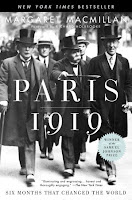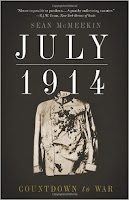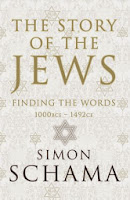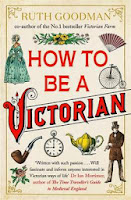1. Title: Paris 1919 and The War that Ended Peace
Author: Margaret MacMillan
Why I’ve picked them: I’m posting these together since they’re both about WWI and by the same author. Paris 1919 predates The War that Ended Peace and explains everything that happened at the Paris Peace Conference in 1919. Its decisions continue to influence our world today. The War That Ended Peace dives into exploring how the world changed in WWI, how alliances emerged and war erupted from peace.

2. Title: The Story of the Jews: Finding the Words
Author: Simon Schama
Why I picked it: This is the story of the Jewish people, from 1000 BCE to 1492 CE. It explores the movements, the kingdom, the words and beliefs. Insightful and interesting, it explored the longevity of the people and the words that unite the faith.
3. Title: Histories of Nations: How their Identities were Forged
Author: Various (Edited by Peter Furtado)
Why I picked it: This book tells the story of many nations. What makes it so wonderful is that each country is written about by someone from it. The stories of the countries are thus told in the words of a representative of that country. Prejudices from one point of view are thus wiped away.
4. Title: The Silk Roads: A New History of the World
Author: Peter Frankopan
Why I picked it: History is often told from a Euro-centric or North-American perspective. This book takes the globe and spins it, focusing instead on the crossroads of Asia and Europe, the meeting of East and West, and uncovers centuries of history from a new perspective.
5. Title: Why the West Rules for Now
Author: Ian Morris
Why I picked it: Like The Silk Roads, this book examines east and west. What is different is that it chronicles this journey of history in parallel stories of development of the east and west. Who is culturally and materially ahead is also shown throughout.
6. Title: July 1914
Author: Sean McMeekin
Why I picked it: Before WWI changed the world, July 1914 existed. In that month, many decisions were made. What’s so fascinating, is that the war was not a foregone conclusion, as we may believe now. There were many points when actions could have been different and even when the war perhaps might even have been prevented.
7. Title: A History of the World in 100 Objects
Author: Neil MacGregor
Why I picked it: History, from ancient prehistory to the modern era, is unveiled through one object at a time. These 100 objects are from the British Museum in London, one of my favorite places. When I visited, I decided that I could camp out there for about a month. This book is a delightful way to spend more time in the museum and in history itself.
8. Title: George Washington’s Secret Six: The Spy Ring that Saved the American Revolution
Author: Brian Kilmeade
Why I picked it: Spies + the American Revolution. That’s what this book explores. It was a part of American history, specifically American independence, that I was unfamiliar with and found to be very interesting.
9. Title: The Nubian Pharaohs: Black Kings on the Nile
Author: Charles Bonnet
Why I picked it: The Egyptian Pharaohs are famous and fascinating. Less known are the Nubian kings. This book beautifully explores them, with full color photographs of the archaeological sites of these Nubian Pharaohs.
10. Title: How to be a Victorian
Author: Ruth Goodman
Why I picked it: From food to school, medicine to work, this book delves into the specific details of Victorian life. Books like this are great for research when writing stories and very interesting in general. Ruth Goodman has also lived many of these things in re-enactments and so she understands what it is to be Victorian, not only through research, but through using their same methods, eating their same foods and literally walking in their shoes.
Have you read any of these? What history books do you recommend?
My best to you all,
Megan




